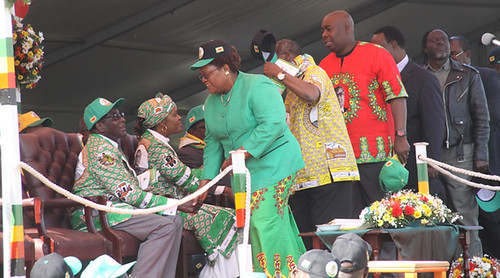
ZANU-PF campaign launch at Highfield on July 5, 2013. Zimbabwe is preparing for national elections on July 31., a photo by Pan-African News Wire File Photos on Flickr.
Zanu-PF manifesto. . .Empowering people through indigenisation
Sunday, 07 July 2013 00:00
Tinashe Farawo
Zimbabwe Sunday Mail
The Zanu-PF manifesto, which was launched by President Mugabe at Zimbabwe Grounds in Harare last Friday, has shown that Zimbabweans are set to rise to the esteemed category of the most empowered people in the world after the implementation of post-election programmes.
According to the manifesto, when the party wins the harmonised elections later this month, it is set to create value of more than US$7,3 billion from the indigenisation of over 1 138 companies across 14 key sectors of the economy in the next five years.
More than US$1, 844, 223, 157, 000 will be created from the idle value of empowerment assets unlocked from parastatals, local authorities, mineral rights and claims.
Agribank will also be capacitated with US$2 billion to finance the stimulation of agricultural productivity. The recapitalisation of Agribank is meant to support farmers throughout the country over the next five years.
Agricultural financing will stimulate economic growth through linkages from manufacturing. Zanu-PF is also set to capacitate the Infrastructural Development Bank of Zimbabwe (IDBZ) with US$3 billion to finance the rehabilitation and construction of physical infrastructure.
About US$2 billion will finance the rehabilitation of social infrastructure. The Small Enterprises Development Corporation (Sedco) will be capacitated to the tune of US$300 million to fund innovative women and youth initiatives. The initiatives will create millions of jobs across all the key sectors of the economy and contribute to export earnings and food security.
The Indigenisation and Economic Empowerment Programme will see an average Gross Domestic Product growth rate of 9 percent in the next five years from the current 4, 4 percent.
Under indigenisation, the party has spearheaded 59 community empowerment schemes in all the country’s 10 provinces.
A total of 133 employee empowerment schemes were also launched while the Youth Empowerment Fund has also been set up.
The fund, which is run through CABS, has to date approved US$6 million with more than US$4 million being disbursed to support 3 477 youth projects.
The Stanbic Wealth Creation Fund has disbursed more than US$5 million to nearly 300 youths while CBZ has disbursed US$745 900 to more than 500 youths.
On housing, about 250 000 low-income units will be built, 1 250 public houses and buildings will be rehabilitated, 2 500 shell factories, flea market stands created, 310 clinics and 300 schools will be built while a new Parliament will be constructed in Mount Hampden.
Zanu-PF is also set to create a Harare Stock Exchange for exclusive participation by indigenous Zimbabweans and companies.
In the education sector, Zanu-PF has maintained the architecture of the country’s education system which has resulted in Zimbabwe recording the highest literacy rate in Africa which was put at 96,4 percent by the United Nations Development Programme.
In 1980, about 1 235 994 pupils were enrolled for primary education while as at last year, primary schools were enrolling 3 019 397.
About 73 160 teachers are working in primary schools while 43 300 are in secondary schools. Of these, 90 and 72 percent are qualified respectively.
In tertiary education, there was only one university with an enrolment of 2 000 at independence in 1980, yet, in 2013, there are now 12 State universities with an enrolment of 69 000.
In 1980, there were eight teachers’ colleges, which enrolled 4 900 students, and two polytechnics, which enrolled 3 000 students.
There are now 14 teachers’ colleges and 13 polytechnics with an enrolment of 17 300 and 17 000 respectively.
Zanu-PF intends to build 300 additional schools throughout the country, especially in resettlement areas in the next five years.
The country’s healthcare has been defined by a robust infrastructure and critical human resource base which has enabled it to overcome untold adversity over the last decade.
The country has a total of six central hospitals, seven provincial hospitals, 48 district hospitals and about 126 rural hospitals.
According to the manifesto 310 additional clinics will be built in the next five years, especially in resettlement areas.
The Zanu-PF government will rehabilitate the country’s power stations in Hwange, Kariba, Harare and Bulawayo to increase the generation of electricity.The party is also set to construct other power generation stations to generate 1 750 megawatts.
The party also wants to invest heavily in the construction of social sector assets such as schools and health facilities as well as make all services like health and education affordable to all Zimbabweans. The Zanu-PF government will also increase the training of professionals and promote human skills development at various levels in the next five years.
No comments:
Post a Comment